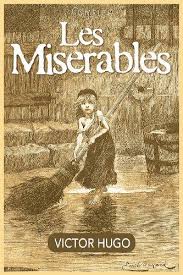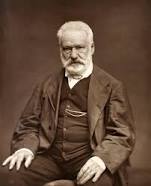Les Misérables Page #19
Les Misérables is a French historical novel by Victor Hugo, first published in 1862, that is considered one of the greatest novels of the 19th century. In the English-speaking world, the novel is usually referred to by its original French title.
When he conversed with that infantile gayety which was one of his charms, and of which we have already spoken, people felt at their ease with him, and joy seemed to radiate from his whole person. His fresh and ruddy complexion, his very white teeth, all of which he had preserved, and which were displayed by his smile, gave him that open and easy air which cause the remark to be made of a man, "He's a good fellow"; and of an old man, "He is a fine man." That, it will be recalled, was the effect which he produced upon Napoleon. On the first encounter, and to one who saw him for the first time, he was nothing, in fact, but a fine man. But if one remained near him for a few hours, and beheld him in the least degree pensive, the fine man became gradually transfigured, and took on some imposing quality, I know not what; his broad and serious brow, rendered august by his white locks, became august also by virtue of meditation; majesty radiated from his goodness, though his goodness ceased not to be radiant; one experienced something of the emotion which one would feel on beholding a smiling angel slowly unfold his wings, without ceasing to smile. Respect, an unutterable respect, penetrated you by degrees and mounted to your heart, and one felt that one had before him one of those strong, thoroughly tried, and indulgent souls where thought is so grand that it can no longer be anything but gentle. As we have seen, prayer, the celebration of the offices of religion, alms-giving, the consolation of the afflicted, the cultivation of a bit of land, fraternity, frugality, hospitality, renunciation, confidence, study, work, filled every day of his life. Filled is exactly the word; certainly the Bishop's day was quite full to the brim, of good words and good deeds. Nevertheless, it was not complete if cold or rainy weather prevented his passing an hour or two in his garden before going to bed, and after the two women had retired. It seemed to be a sort of rite with him, to prepare himself for slumber by meditation in the presence of the grand spectacles of the nocturnal heavens. Sometimes, if the two old women were not asleep, they heard him pacing slowly along the walks at a very advanced hour of the night. He was there alone, communing with himself, peaceful, adoring, comparing the serenity of his heart with the serenity of the ether, moved amid the darkness by the visible splendor of the constellations and the invisible splendor of God, opening his heart to the thoughts which fall from the Unknown. At such moments, while he offered his heart at the hour when nocturnal flowers offer their perfume, illuminated like a lamp amid the starry night, as he poured himself out in ecstasy in the midst of the universal radiance of creation, he could not have told himself, probably, what was passing in his spirit; he felt something take its flight from him, and something descend into him. Mysterious exchange of the abysses of the soul with the abysses of the universe! He thought of the grandeur and presence of God; of the future eternity, that strange mystery; of the eternity past, a mystery still more strange; of all the infinities, which pierced their way into all his senses, beneath his eyes; and, without seeking to comprehend the incomprehensible, he gazed upon it. He did not study God; he was dazzled by him. He considered those magnificent conjunctions of atoms, which communicate aspects to matter, reveal forces by verifying them, create individualities in unity, proportions in extent, the innumerable in the infinite, and, through light, produce beauty. These conjunctions are formed and dissolved incessantly; hence life and death. He seated himself on a wooden bench, with his back against a decrepit vine; he gazed at the stars, past the puny and stunted silhouettes of his fruit-trees. This quarter of an acre, so poorly planted, so encumbered with mean buildings and sheds, was dear to him, and satisfied his wants. What more was needed by this old man, who divided the leisure of his life, where there was so little leisure, between gardening in the daytime and contemplation at night? Was not this narrow enclosure, with the heavens for a ceiling, sufficient to enable him to adore God in his most divine works, in turn? Does not this comprehend all, in fact? and what is there left to desire beyond it? A little garden in which to walk, and immensity in which to dream. At one's feet that which can be cultivated and plucked; over head that which one can study and meditate upon: some flowers on earth, and all the stars in the sky. CHAPTER XIV--WHAT HE THOUGHT One last word. Since this sort of details might, particularly at the present moment, and to use an expression now in fashion, give to the Bishop of D---- a certain "pantheistical" physiognomy, and induce the belief, either to his credit or discredit, that he entertained one of those personal philosophies which are peculiar to our century, which sometimes spring up in solitary spirits, and there take on a form and grow until they usurp the place of religion, we insist upon it, that not one of those persons who knew Monseigneur Welcome would have thought himself authorized to think anything of the sort. That which enlightened this man was his heart. His wisdom was made of the light which comes from there. No systems; many works. Abstruse speculations contain vertigo; no, there is nothing to indicate that he risked his mind in apocalypses. The apostle may be daring, but the bishop must be timid. He would probably have felt a scruple at sounding too far in advance certain problems which are, in a manner, reserved for terrible great minds. There is a sacred horror beneath the porches of the enigma; those gloomy openings stand yawning there, but something tells you, you, a passer-by in life, that you must not enter. Woe to him who penetrates thither! Geniuses in the impenetrable depths of abstraction and pure speculation, situated, so to speak, above all dogmas, propose their ideas to God. Their prayer audaciously offers discussion. Their adoration interrogates. This is direct religion, which is full of anxiety and responsibility for him who attempts its steep cliffs. Human meditation has no limits. At his own risk and peril, it analyzes and digs deep into its own bedazzlement. One might almost say, that by a sort of splendid reaction, it with it dazzles nature; the mysterious world which surrounds us renders back what it has received; it is probable that the contemplators are contemplated. However that may be, there are on earth men who--are they men?--perceive distinctly at the verge of the horizons of revery the heights of the absolute, and who have the terrible vision of the infinite mountain. Monseigneur Welcome was one of these men; Monseigneur Welcome was not a genius. He would have feared those sublimities whence some very great men even, like Swedenborg and Pascal, have slipped into insanity. Certainly, these powerful reveries have their moral utility, and by these arduous paths one approaches to ideal perfection. As for him, he took the path which shortens,--the Gospel's.
Translation
Translate and read this book in other languages:
Select another language:
- - Select -
- 简体中文 (Chinese - Simplified)
- 繁體中文 (Chinese - Traditional)
- Español (Spanish)
- Esperanto (Esperanto)
- 日本語 (Japanese)
- Português (Portuguese)
- Deutsch (German)
- العربية (Arabic)
- Français (French)
- Русский (Russian)
- ಕನ್ನಡ (Kannada)
- 한국어 (Korean)
- עברית (Hebrew)
- Gaeilge (Irish)
- Українська (Ukrainian)
- اردو (Urdu)
- Magyar (Hungarian)
- मानक हिन्दी (Hindi)
- Indonesia (Indonesian)
- Italiano (Italian)
- தமிழ் (Tamil)
- Türkçe (Turkish)
- తెలుగు (Telugu)
- ภาษาไทย (Thai)
- Tiếng Việt (Vietnamese)
- Čeština (Czech)
- Polski (Polish)
- Bahasa Indonesia (Indonesian)
- Românește (Romanian)
- Nederlands (Dutch)
- Ελληνικά (Greek)
- Latinum (Latin)
- Svenska (Swedish)
- Dansk (Danish)
- Suomi (Finnish)
- فارسی (Persian)
- ייִדיש (Yiddish)
- հայերեն (Armenian)
- Norsk (Norwegian)
- English (English)
Citation
Use the citation below to add this book to your bibliography:
Style:MLAChicagoAPA
"Les Misérables Books." Literature.com. STANDS4 LLC, 2025. Web. 7 Feb. 2025. <https://www.literature.com/book/les_mis%C3%A9rables_13>.








Discuss this Les Misérables book with the community:
Report Comment
We're doing our best to make sure our content is useful, accurate and safe.
If by any chance you spot an inappropriate comment while navigating through our website please use this form to let us know, and we'll take care of it shortly.
Attachment
You need to be logged in to favorite.
Log In